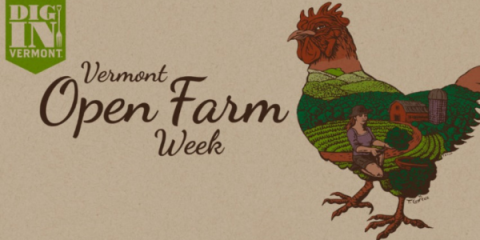As described in the Vermont Food System Plan Agritourism Issue Brief, "Agritourism is a way for Vermont farms to differentiate themselves through authentic experiences that strengthen the Vermont brand and increase product sales." The Vermont Agency of Agriculture, Food & Markets works in partnership with public, private, and nonprofit entities to increase the economic impact of agritourism on the working landscape.
Agritourism is an important strategy for promoting agricultural literacy, through activities to promote a better understanding of food and agriculture among an increasingly urbanized public. It contributes to farm viability and the vitality of the working landscape by providing additional income to farm businesses.
Vermont Laws Related to Agritourism
Act 31 of 2021: Limiting Liability for Agritourism
On July 1, 2021, Vermont Act 31 (H.89), An act relating to limiting liability for agritourism, took effect. Act 31 acknowledges that there are “inherent risks” in participating in agritourism activities and shifts those risks to properly warned consumers. The Act covers recreational, educational, entertainment, historical and nature-based activities on farms, such as farm tours and pick-your-own. It does not include on-farm lodging, retail establishments or farm stands.
To qualify for the limitation on liability, an agritourism host must post the required warning notice in a clearly visible location at or near the main entrance to each agritourism activity and include the warning notice language in every written contract between the agritourism host and a participant.
The required warning notice must read:
WARNING: Under Vermont law, an agritourism host is not liable for the injury or death of a participant in an agritourism activity resulting from the inherent risk of the agritourism activity. Inherent risks include the risk of animals, weather, land conditions, and the potential for you as a participant to act in a negligent way that may contribute to your own injury or death. You are assuming the risk of participating in this agritourism activity.
The warning notice must be posted and maintained on a sign:
- in a clearly visible location at or near the main entrance to each agritourism activity
- in black letters at least one inch in height containing the above warning notice
For more information about Act 31, visit the Vermont Agritourism Collaborative Safety, Liability, and Regulations page. University of Vermont Extension is distributing a limited supply of printed signs at no cost to farms. Contact vtagritourism@uvm.edu if you would like a sign.
Act 143 of 2018: Accessory On-Farm Businesses
As of July 1, 2018, Vermont Act 143 (H.663), An act relating to municipal land use regulation of accessory on-farm businesses, took effect. The law creates a statewide municipal land use category called accessory on-farm business (AOFB) and limits municipal land use regulation of an AOFB. Vermont Act 181 (H.687) of 2024 further expanded an AOFB’s ability to sell farm products, added new types of eligible products, and created related Act 250 exemptions. A farmer, farm resident, or farm lessee may operate a subordinate business located on a farm regulated by the Agency of Agriculture, Food & Markets under the Required Agricultural Practices (RAPs) rules that includes one or both of the following types of businesses:
- The storage, preparation, processing, and sale of qualifying products produced on a farm; the sale of products that name, describe, or promote the farm or accessory on-farm business, including merchandise or apparel that features the farm or accessory on-farm business; or the sale of bread or baked goods.
- Educational, recreational, or social events that feature agricultural practices or qualifying products, or both. Such events may include tours of the farm, farm stays, tastings and meals featuring qualifying products, and classes or exhibits in the preparation, processing, or harvesting of qualifying products.
For more information about Act 143, visit the Accessory On-Farm Businesses page.
These general summaries of Act 31 and Act 143 are provided for public notice and are not exhaustive. They are not intended to aid in the interpretation of legislation and do not alter or effect an Act’s legal requirements. Individuals should always review the law—and seek legal advice as necessary—to ensure they are meeting its requirements.
Agritourism & Agricultural Land Planning Resources
Vermont Agritourism Collaborative, University of Vermont Extension
Information, resources, and connections for farmers offering agritourism experiences in Vermont and beyond
Find a Community Assistance Specialist, Vermont Department of Environmental Conservation
Community Assistance Specialists can help you identify the necessary environmental permits or approvals for your project.
Rural Enterprises Information, Northeast Organic Farming Association of Vermont
Resources to support farms with understanding how land use regulations affect the rural enterprises they may develop or already have on their farms
Industry Resources for Tourism & Marketing, Vermont Department of Tourism & Marketing
Industry news, research, and opportunities to promote your business
Resources for DigInVT Businesses
DigInVT place listings are agricultural or culinary businesses that offer the public an authentic Vermont food experience.
Agritourism and Farm Tours
Resource collection from the USDA National Agricultural Library




